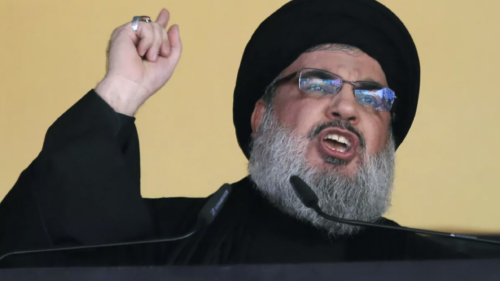Academy SITREP – Israel Kills Hezbollah Leader Nasrallah in Strike Near Beirut

What has Happened:
- Yesterday, Israel targeted Hezbollah leader Hassan Nasrallah in a massive airstrike south of Beirut.
- Israeli forces destroyed several residential buildings, which is reportedly where Hezbollah’s underground central headquarters was located.
- The attack followed two weeks of complex intelligence operations, targeted killings of other Hezbollah leaders, and heavy aerial bombardments of southern Lebanon designed to stop Hezbollah from attacking across the border into northern Israel.
- Nasrallah’s death will have a significant impact not only on Hezbollah, but also on Iran, and the proxy network that Tehran has built across the region.
- Iran’s supreme leader, Ayatollah Ali Khamenei, convened the Supreme National Council to an emergency meeting at his home after the strike.
- The strike also killed Muhammad Ali Ismail, the commander of Hezbollah’s missile unit in southern Lebanon, as well as his deputy, and other commanders/operatives that were present at the meeting.
- PM Netanyahu left the U.S. and headed back to Israel yesterday following the strike and told the UN at his address that Israel’s campaign against Hezbollah would continue, reducing the chances of an internationally backed ceasefire taking hold in the near-term.
- The hope is that all of these operations will convince Hezbollah to pull back from southern Lebanon, but the concern is that this latest strike significantly escalated the situation, elevating the risk of a broader conflict.
Why it Matters:
“Nasrallah’s death is an incredible boost to the Israeli efforts to diminish Hezbollah’s capacity to wage terror. The United States certainly sheds no tears at the news of his death. However, every leader can be replaced. Nasrallah is no exception. Tehran will have to assume a more visible posture against Israel in terms of next steps, a policy that it is reluctant to embrace. The ‘option of last choice’ for Iran’s clerical and IRGC leadership is to demand that its new President Pezeshkian be the face of a more aggressive military response against Israel. This would not end well for Tehran or Pezeshkian politically. Additionally, Israel wants desperately to reestablish normalcy for the displaced Israelis. However, that will only happen over time. If Israel can push Hezbollah and its associated infrastructure north of the Litani River, the IDF must ensure that northern Israel remains secure from follow-on attacks. Of course, Israeli leadership understands this, but its citizens have a higher risk tolerance than almost any nation. They are the fabric of Israel’s existence. It would not be surprising to see Israelis move back home into northern Israel at a faster than expected pace.” – General Spider Marks
“The IDF report that Hezbollah’s leader Hassan Nasrallah is dead is another indicator that the IDF has shifted the center of gravity from Hamas to Hezbollah. The IDF is escalating the situation in Lebanon with the intent to de-escalate it. Israel has now taken out much of Hezbollah’s leadership with this attack and has thrown their command & control into chaos with the previous pager/walkie-talkie attacks. The attacks are significant and could move the region closer to war. What Iran’s response will be is the next question. Their past responses have been limited while leaving the war up to their proxy forces. The last thing that Iran’s leaders want is for Israel to turn to them. Israel’s intelligence capabilities to strike anywhere has Iran’s leaders thinking twice about further escalation. The large U.S. naval presence is also a deterrent. The chances for a ceasefire have been drastically diminished with the IDF’s momentum. The Hezbollah command center was located underground and beneath a residential building. Israel has sophisticated sensors, precision weapons, and exquisite intelligence, but there is only so much they can do to avoid collateral damage when Hamas and Hezbollah hide and conduct war amongst the civilian populace.” – General Robert Walsh
“This is a huge assassination, and I would expect all Iranian proxies to now be targeting Israeli leaders. I believe the Israeli assumption that this will quiet Hezbollah is flawed. Hezbollah will continue its attacks as Nasrallah stated until the Gaza war is over. Iran and Hezbollah will pick a new leader and escalate the violence to a higher level.” – General Frank Kearney
“Reports have stated that as many as 6 brigade commanders, 30 battalion commanders, 8 other senior leaders (including the commander of operations), and maybe as many as 12 of the top 15 Hezbollah leaders have also been killed. This will have a significant impact on Hezbollah’s operational decision-making cycle, and all of this adds significant concern/risk as to how to communicate moving forward. The cumulative effect of the above offers Israel and the U.S. an opportunity to negotiate from a position of strength due to uncertainty around command & control. Uncertainty can be leveraged as an advantage.” – General Mastin Robeson


